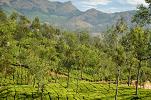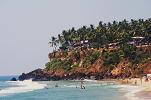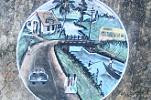|
|
Kerala Culture
A Guide To The Traditions of Kerala
| This page gives an insight into Kerala culture and describes some of the art forms, practices and traditions that help define Kerala's culturally unique appeal. Included are useful tips on how to see performances of Kerala's famous Kathakali dance, and where to find its mysterious Theyyam rituals or Kalarippayattu martial art dating from the 12th century. |
Kathakali Dance
What is Kathakali? Kathakali is a form of classical Indian dance / drama that originated in Kerala in the 17th Century AD and remains a significant part of Kerala culture. Characters in the dance wear elaborate make-up and costume and perform significant series of detailed hand gestures and body movements.Music accompanies the performers, and stories commonly depict events of the Mahabharata or Ramayana (Sanskrit epics of ancient India). Though performances were originally written to be performed over an entire night and often took place at temples, shorter versions are now frequently shown. Performers of Kathakali must train carefully for a decade or more at specialist institutions. Actors prepare much of their own costume and make-up, thus 'transforming' themselves into the charactures they are about to play. If attending a performance, note that make-up is often applied prior to the performance on the stage and can be watched by the audience. How can I see a performance? Performances take place at many Kerala culture centres across the state. Some Kathakali schools also encourage visitors. A few places to see Kathakali are listed below. Local tourist information centres can also help you find perormances.Kochi/Cochin
Kerala Kathakali Centre,
KB Jacob Road,
Fort Cochin.
Inexpensive prices and showy performances, these shows are popular with foreign tourists as helpful translation is given.
ErnakulamKalathiparambil Lane,
Ernakulam (mainland Kochi).
One of the oldest Kathakali theatres in Kerala offering authentic, small scale shows that focus on the religious roots of Kathakali.
Thrissur
Kerala Kalamandalam,
Cheruthuruthy (about 30km from Thrissur, connected by bus),
www.kalamandalam.org
School of various Keralan dance and music forms including Kathakali, half day tours are available. Look out on the website for performances. Long study courses are available.
Thiruvanathapuram/Trivandrum
Margi Kathakali School,
Behind the Fort School,
Fort, tel.2478806
Beginner and advanced courses available. Visitors can watch students on weekday mornings, costume not worn.
Look out for authentic all night performances of Kathakali that still occur during many of Kerala's festivals.
Theyyam
What is Theyyam? Theyyam is an ancient riualistic temple art form thought to pre-date Hinduism. The word 'Theyyam' means form or shape. Protagonists dress in hugely elaborate costumes to portray a particular deity or heroic character, and are 'possessed' while in the form of the deity/hero. Drumming, frenzied dancing and the mystery that surrounds this ritualistic expression all contribute to a surreal atmosphere.How can I see a performance? Theyyam is performed at houses, temples, shrines and sometimes during wedding celebrations. The season to see Theyyam is between October and May. Northern Kerala, especially the Kannur and Kasaragod districts are the best places to find performances.Kannur
Kerala Folklore Academy tel.2778090,
nr. Chirakkal Pond Valapattanam,
20km north of Kannur.
Occasional performances are shown and information can be given. Costumes are kept here, giving a good opportunity to look up close.
Bekal
Information centre at Bekal Fort.
You can obtain an annual Theyyam calendar from here and other useful information on Kerala culture/shows.
Asking local people in these areas is the best way to get advice about rituals taking place. Temples and shrines often have annual performances. Important Theyyam performances can attract crowds of thousands.
Kalarippayattu
What is Kalarippayattu? Believed by some to be the world's oldest form of martial art, this ancient tradition of disciplined training has belonged to Kerala culture since the 12th Century. Students are taught with varous weapons and use techniques both inernally and externally to achieve maximum flexibility and suppleness.Masters, or Gurukkal teach students in a kalari which acts as a school and training hall. There is always a gaurdian deity's shrine (from Hindu belief) in the kalari. How can I see a performance? Performances are becoming increasingly popular on the tourist scene, and so visiting a local tourist information centre or looking for posters/flyers in tourist hotspots can be a good place to begin.CVN Kalari is a training school of Kalarippayattu with branches in Kerala (several listed below). Training and treatment of injuries in a manner similar to Ayurveda can be booked here, as well as demonstrations. Calicut
CVN Kalari,
Edakkad, Calicut 673005.
www.cvnkalari.org Kottayam
CVN Kalari,
Nehru Stadium,
Kottayam 686001.
www.cvnkalari.net Kollam
CVN Kalari,
Puliyathumukku, Kilikolloor,
Kollam.
www.cvnkalariheritage.com
Mohiniyattam
What is Mohiniyattam? Mohiniyattam is dance performed by a solo woman and is one of eight classical Indian dance forms. The word is formed from mohini meaning 'woman who enchants onlookers' and aattam meaning 'graceful, sensual body movements'. The dance originated in Kerala and is often referred to as the Dance of the Enchantress. The dancer wears a white and gold sari, and her subtle movements an facial expressions are designed to allure and enchant the mind and reflect the graceful nature of Kerala's land. She is accompanied by music, usually with a vocal in Manipravalam, a mixture of Sanskrit and Malayalam.
Malayalam Cinema
For a taste of modern Kerala culture, try some Malayalam language cinema. Especially successful in the late 80's when films stood out for their careful plots mixing humour and melancholy, films often employ excellent musical scores and cinematography. The film 'Piravi' of this period recieved international acclaim at the Cannes Film Festival and the Edinburgh Festival. Kerala stages its own International Film Festival - the IFFK - in Thiruvanathapuram/Trivandrum where examples of Malayalam cinema can be seen. The festival is held in November or December each year.
Timing your trip to coincide with one of Kerala's many festivals can be a great way to see the Kerala culture come alive.
More useful advice and guides for travel to Kerala.
^TOP^
Click here to leave Kerala Culture and return to Travel India Goa Guide Home
Kerala's History -
Keralan Food -
Pictures of Kerala -
Map Of Kerala -
Houseboats -
Goa Guide

|
|
'Not to be missed' destinations of Kerala
Tea fields at Munnar

Incredible scenery and mountain air in Kerala's tea growing region.
Relaxing on Varkala beach

Varkala attracts worldwide travellers and though laid back, is well established on the backpacker trail.
Historical Fort Cochin

Enjoy the historic buildings, great food and bohemian ambience in Kerala's attractive Fort Cochin.
|
|






